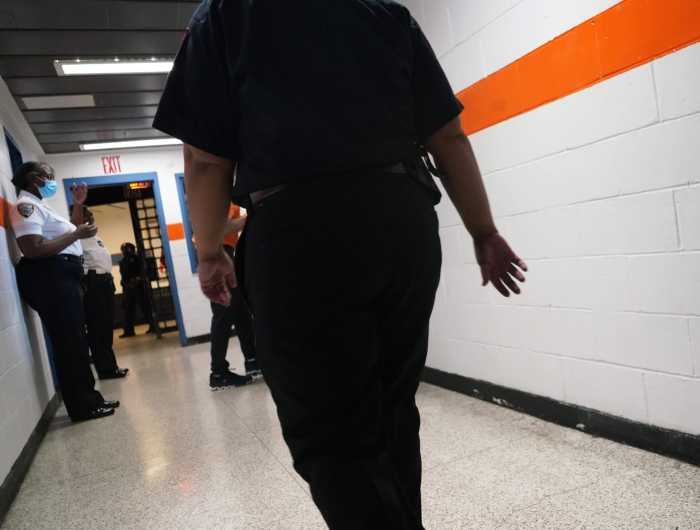A national panel of medical experts endorsed an injectable version of the HIV prevention medication known as PrEP in a significant move that will require insurance providers to fully cover the shots.
The U.S. Preventive Services Task Force (USPSTF) — an independent panel of experts who review evidence and issue recommendations for preventative services — gave an “A” rating to injectable PrEP on Aug. 22, which is notable because the Affordable Care Act stipulates that insurance providers must cover drugs given an “A” or “B” rating. An “A” grade means there is high certainty that the drug’s net benefit is substantial.
The USPSTF has backed Truvada, which is one of the daily pill options for PrEP, and the most recent endorsement also included support for Descovy, another daily PrEP pill.
The USPSTF recommended PrEP for sexually active adults and adolescents who have engaged in anal or vaginal sex in the last six months and have an STI, a sexual partner with HIV, or a history of inconsistent or no condom use with people whose HIV status is unknown. The panel also recommended PrEP for sex workers, transgender women, sexually active men, and people who inject drugs and have a drug-injecting partner living with HIV or who shares injection equipment.
The latest move has been hailed as a step forward in the fight for PrEP, but there are potential roadblocks looming — including a lawsuit against the HIV prevention medication pending in the conservative Fifth Circuit Court of Appeals as well as concerns that insurance companies will try to work around the requirement.
The FDA first approved PrEP pills in 2012 and subsequently rubber-stamped injectable PrEP late in 2021. There is hope that the injectable version will improve uptake because it only calls for a shot every other month instead of daily use or, as some local health departments have suggested, a “PrEP on demand” approach in which people take the pill around their sexual schedule instead of every day. There are enormous racial disparities among candidates eligible for PrEP: As of 2019, just 8% of Black people and 14% of Latinx individuals eligible for PrEP received prescriptions for it, compared to 63% of white people, according to federal research.
Injectable PrEP has performed remarkably well in trials in recent years. A clinical trial evaluating the effectiveness of PrEP injections, which uses the drug cabotegravir and is branded as Apretude, ended early in 2020 after it significantly outperformed the pill version of the HIV prevention medication. In the trial, HIV incidence rates for people taking Truvada for PrEP were 1.21% compared to .38% for cabotegravir, meaning cabotegravir offered a 69% reduction in risk of infection compared to Truvada.
Coverage for PrEP has seen incremental progress in recent years at both the national and state levels. In 2019, for example, then-Governor Andrew Cuomo eliminated out-of-pocket PrEP costs for certain health insurance plans in New York State, and select other states implemented the same policy. Two years later, the Biden administration issued similar guidance ordering health insurance companies to provide oral PrEP at no extra cost. The Departments of Labor, Treasury, and Health and Human Services issued a joint statement at the time citing the USPSTF’s 2019 recommendation to cover the medication at no extra cost. Generic PrEP has also emerged, albeit slowly, amid pressure from activists.
PrEP4All, which works to improve access to PrEP, welcomed the USPSTF’s recommendation while also warning that the future is uncertain. Michael Chancley, a spokesperson for PrEP4All who said he has used PrEP since 2015, described the panel’s endorsement of injectable PrEP as “a huge step towards making it more accessible.”
Still, he said, many PrEP users have contacted PrEP4All to complain about barriers to coverage ever since the panel issued its first recommendation to cover the medication.
“We really need the federal government to step up to enforce coverage from insurers, as well as strongly defend the legitimacy of USPSTF in their appeal of Braidwood v. Becerra,” Chancley said, referring to the pending legal challenge. “Also, with the annual list price of long-acting injectable PrEP remaining over $22,500, this means millions of uninsured individuals will still not be able to afford it if Congress does not pass a federally-funded national PrEP program to fill the gaps for those with coverage barriers.”
He added, “Federal enforcement of USPSTF and funding a National PrEP Program are necessary to address the dismal disparities of PrEP uptake, especially when only 11% of Black individuals who could benefit from PrEP are using it.”
The HIV+Hepatitis Policy Institute, which is a national non-profit working to promote affordable and quality care for people living with or at risk of HIV and hepatitis, also praised the “A” rating nearly two years after the organization led 62 other groups in asking the panel to recommend injectable PrEP.
“Including a long-acting drug as part of the USPSTF PrEP recommendation is an important step in improving HIV prevention efforts in the United States,” Carl Schmid, the executive director of the HIV+Hepatitis Policy Institute, said in a written statement. “While daily oral PrEP is highly effective, adherence can be an issue. That is why the FDA called long-acting PrEP superior to daily oral PrEP.”
Schmid stressed that the federal government should immediately issue guidance to direct insurers to cover all forms of PrEP without cost-sharing. He noted that it took two years for the Center for Consumer Information and Insurance Oversight to provide guidance to insurers after the USPSTF’s 2019 recommendation for PrEP.
“That delay helped lead to many PrEP users being charged cost-sharing by insurers, a situation that still continues today,” Schmid said.
Amida Care, a Medicaid managed care Special Needs Plan serving individuals impacted by HIV in New York, also applauded the USPSTF’s new recommendation.
“PrEP is a game-changing medication that has proven 99% effective in preventing HIV transmission,” Amida Care CEO Doug Wirth said in a written statement. “Increasing PrEP among persons placed at the highest risk for HIV — communities of color and LGBTQ+ communities, including young gay/bisexual men of color, women of color and transgender women of color — is vital to our efforts to end the epidemic.”
Adding injectable PrEP to the arsenal of tools to fight HIV, Wirth said, “provides a much-needed option for those who have difficulty taking pills daily.”


































